

4 Ways that Mass Surveillance Destroys the Economy. Prosperity Requires Privacy Privacy is a prerequisite for a prosperous economy.
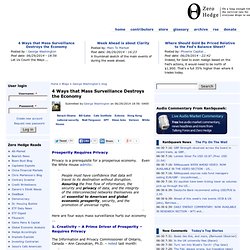
Even the White House admits: People must have confidence that data will travel to its destination without disruption. Assuring the free flow of information, the security and privacy of data, and the integrity of the interconnected networks themselves are all essential to American and global economic prosperity, security, and the promotion of universal rights. Here are four ways mass surveillance hurts our economy ... 1. The Information and Privacy Commissioner of Ontario, Canada – Ann Cavoukian, Ph.D. – noted last month: The Financial Post reported in February: “Big Brother culture will have adverse effect on creativity, productivity“.
Christopher Lingle – visiting professor of economics at ESEADE, Universidad Francisco Marroquín – agrees that creativity is a key to economic prosperity. Edward Snowden said last year: Silicon Valley is currently one of the largest drivers of the U.S. economy. 2. 3. 4. The Worst Places On The Planet To Be A Worker. Where are the worst places on the planet to be a worker?
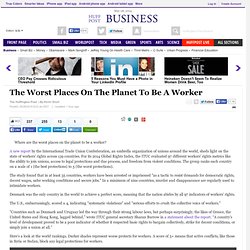
A new report by the International Trade Union Confederation, an umbrella organization of unions around the world, sheds light on the state of workers' rights across 139 countries. For its 2014 Global Rights Index, the ITUC evaluated 97 different workers' rights metrics like the ability to join unions, access to legal protections and due process, and freedom from violent conditions.
The group ranks each country on a scale of 1 (the best protections) to 5 (the worst protections). The study found that in at least 35 countries, workers have been arrested or imprisoned "as a tactic to resist demands for democratic rights, decent wages, safer working conditions and secure jobs. " In a minimum of nine countries, murder and disappearance are regularly used to intimidate workers.
Working for the Few: Political capture and economic inequality - bp-working-for-few-political-capture-economic-inequality-200114-en.pdf. Oftwominds-Charles Hugh Smith: The Knowledge Economy's Two Classes of Workers. A Community-Based Alternative to the Welfare State. It is important to discuss alternatives before the Status Quo devolves and collapses, so we have an intellectual framework to guide healthier, more sustainable alternatives once the current system implodes.
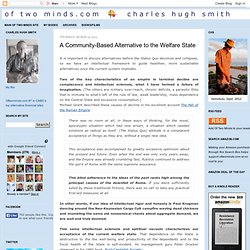
Two of the key characteristics of an empire in terminal decline are complacency and intellectual sclerosis, what I have termed a failure of imagination. (The others are military over-reach, chronic deficits, a parasitic Elite that is immune to what's left of the rule of law, weak leadership, mass dependence on the Central State and excessive consumption.) There was no room at all, in these ways of thinking, for the novel, apocalyptic situation which had now arisen, a situation which needed solutions as radical as itself. (The Status Quo) attitude is a complacent acceptance of things as they are, without a single new idea.
This acceptance was accompanied by greatly excessive optimism about the present and future. . - Community groups could be funded using the following principles: a. 1. The Rise of the New Global Elite - Chrystia Freeland. F.
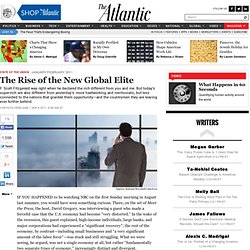
Scott Fitzgerald was right when he declared the rich different from you and me. But today’s super-rich are also different from yesterday’s: more hardworking and meritocratic, but less connected to the nations that granted them opportunity—and the countrymen they are leaving ever further behind. Stephen Webster/Wonderful Machine If you happened to be watching NBC on the first Sunday morning in August last summer, you would have seen something curious. Cornel West: How Intellectuals Betrayed the Poor. The World Economy. AlterNet: System Failure: We Are Approaching the End of Society As We Know It. Who Will Fix the US Economy? - Henry Mintzberg. Exit from comment view mode.
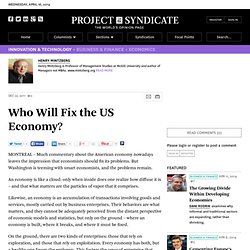
Click to hide this space MONTREAL – Much commentary about the American economy nowadays leaves the impression that economists should fix its problems. But Washington is teeming with smart economists, and the problems remain. An economy is like a cloud: only when inside does one realize how diffuse it is – and that what matters are the particles of vapor that it comprises. Likewise, an economy is an accumulation of transactions involving goods and services, mostly carried out by business enterprises. On the ground, there are two kinds of enterprises: those that rely on exploration, and those that rely on exploitation. Economic development proceeds through a cycle that begins with young, exploring enterprises introducing new products, services, and processes. Contrast this with the America of bailouts, where the fat are considered “too big to fail.” This American problem goes far beyond the bailouts.
On top of this, many US startups now leap into exploitation.